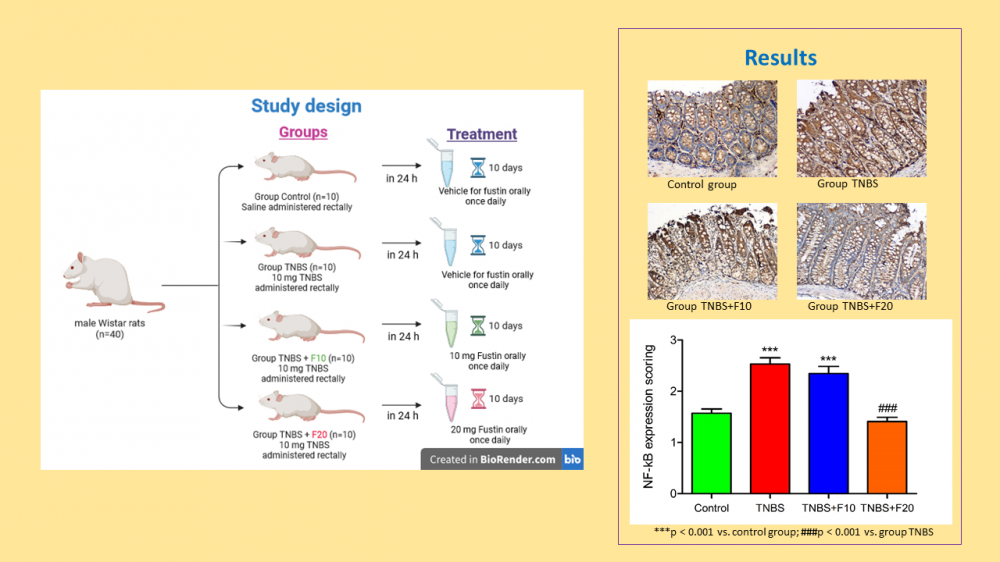JOURNAL 3071
Records of Agricultural and Food Chemistry
Year: 2024 Issue: 3 Special Issue: Abstracts 3rd. TCS, International Food Chemistry Congress February 29-March 03,2024 Antalya Türkiye
p.59 - 59
Viewed 1388 times.
-
Nadezhda Stefanova

-
Miglena Nikolova

-
Milena Salbashian

-
Mehmed Abtulov

-
Vele Tešević

-
Miroslav Novakovic

-
Danail Pavlov

-
Antoaneta Georgieva

-
Miroslav Eftimov

-
Maria Tzaneva

-
Stefka Valcheva-Kuzmanova

GRAPHICAL ABSTRACT

ABSTRACT
Cotinus coggygria is a shrub, rich in tannins and flavonoids, used in traditional medicine [1]. Nuclear factor kappa B (NF-κB) is a crucial modulator of inflammatory reactions and immune responses [2]. This study aimed to evaluate the effect of the flavonoid fustin on the immunohistochemical expression of NF-κB in a rat colitis model induced by trinitrobenzenesulfonic acid (TNBS). Fustin was isolated from Cotynus coggygria heartwood and purified [3]. Forty male Wistar rats allocated to four groups: Control, TNBS, TNBS+F10, and TNBS+F20. In groups TNBS, TNBS+F10, and TNBS+F20, colitis was induced by rectal administration of 10 mg TNBS. Treatment began 24 hours after colitis induction and continued for 8 days. Fustin at a dose of 10 mg/kg and 20 mg/kg prepared as a suspension was given orally to TNBS+F10 and TNBS+F20 groups, respectively, while the vehicle for fustin was given to groups Control and TNBS. On the 10th day of the experiment, samples of colon tissue from the site of injury were taken and processed for immunohistochemical investigations. Tissue sections, 4 µm thick, were placed on silanized slides. NF-κB expression was determined using a rabbit anti-NF-kB-p100 polyclonal antibody (E-AB-32222; Elabscience, USA), diluted 1:200, following the protocol for universal highly sensitive visualization system for antibody detection EnVision FLEX. Immunohistochemical evaluation was performed semi-quantitatively in 50 cells of each probe using the following score: 1 – no cytoplasmic staining, 2 – weak staining, 3 – moderate staining, 4 – strong staining. The average intensity of the immune reaction was calculated using the formula: number of cells of each type x corresponding coefficient (1, 2, 3 or 4) x total number of cells-1. The results showed that NF-κB immunohistochemical expression score in the control group was 1.57±0.57, while in TNBS group it was significantly higher (2.53±0.86; p<0.001 vs. Control). The antibody expression score of TNBS+F10 group (2.35±0.96) was slightly reduced. The score of TNBS+F20 group (1.41±0.57) did not differ significantly from the control value and was significantly lower (p<0.05) in comparison with that of TNBS group. In conclusion, fustin at a dose of 20 mg/kg reduced the proinflammatory transcription factor NF-κB expression which might contribute for its ameliorative effect against TNBS-induced damage.
KEYWORDS- NF-κB
- colitis
- trinitrobenzenesulfonic acid
- fustin